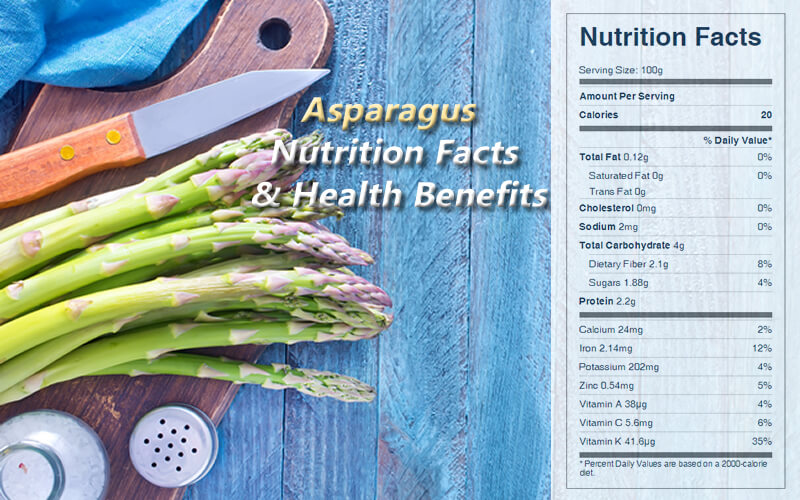Asparagus Nutrition Facts & Health Benefits
Asparagus has been used as a vegetable owing to its distinct flavor. Have you ever wondered why your urine has an odd stench after you eat asparagus? This is due to a unique phytonutrient found in asparagus known as asparagusic acid, but this isn’t a bad thing! Asparagus is high in a key phytonutrient, quercetin, which has a unique ability to stop viral replication.
Nutritional Value of Asparagus
Asparagus is low in food energy and very low in sodium. It is a good source of vitamin B6, calcium, magnesium, and zinc, and a very good source of dietary fibre, protein, beta-carotene, vitamin C, vitamin E, vitamin K, thiamin, riboflavin, rutin, niacin, folic acid, iron, phosphorus, potassium, copper, manganese, and selenium, as well as chromium, a trace mineral that regulates the ability of insulin to transport glucose from the bloodstream into cells.
Six spears of cooked asparagus provide 22 calories, 3.8 g carbohydrate, 2.3 g protein, 0.3 g fat, 1.4 g dietary fiber, 485 IU vitamin A, 10 mg vitamin C, 1 mg niacin, 131 mcg folic acid, 144 mg potassium, 10 mg sodium, 49 mg phosphorus, 18 mg calcium, and 9 mg magnesium.
Raw Asparagus Nutrition Facts Label
Health Benefits of Asparagus
Asparagus really benefits the kidneys and the liver, and because it promotes elimination through the urine, it is warmly recommended for people who have rheumatism and arthritis.
It’s also a great source of folate, a B vitamin that is good for your cardiovascular system and is especially important for pregnant women, because it’s known to help prevent certain birth defects, such as spina bifida.
Asparagus is a great source of inulin. It also contains several anti-inflammatory saponins and flavonoids that include quercetin, rutin, kaempferol, and isorhamnetin, among other vitamins and minerals. The quercetin content and saponins also make asparagus a great support for our immune health.
Inulin is an excellent prebiotic to support overall gut health, and asparagus is a great source of it!
Quercetin is a polyphenolic compound with antioxidant and anti-inflammatory activity that also has a unique ability to stop viral replication of RNA viruses by drawing zinc into your cells. A study analyzed quercetin in asparagus, onions, and green tea and found that asparagus followed onions in its quercetin content, with green tea coming in third.
Saponins are another phytonutrient group that gives asparagus its bitter taste but also affects the immune system. There are numerous saponins found in asparagus that can affect the immune system. While research is still evolving, what’s been identified to date is the ability of two specific saponins, asparanin A and shatavarins, to inhibit the production of proinflammatory cytokines IL-6 and TNF-alpha, reducing inflammation. While there are several saponins found in asparagus, these are two that have been primarily studied but speaks to their ability to work with one another to provide an abundant anti-inflammatory effect.
Asparagus’s key antioxidant ability has been demonstrated with the presence of the flavonoid rutin. From a pharmacological mechanism, rutin inhibits an enzyme called phospholipase. This enzyme aids in the conversion of arachidonic acid from phospholipid cell membranes. Arachidonic acid is a key substrate in the inflammatory cascade that produces several inflammatory mediators.
You can save the water asparagus is cooked in and drink it as a useful diuretic.
Tips: Since asparagus is high in purines, people who suffer from gout should avoid it.
